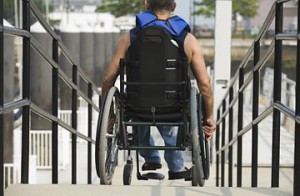Closing the Loophole on Discrimination Against Disabled Americans
In most of the United States, the Americans with Disabilities Act helps people seek legal relief from disability discrimination without having to show that their disability was the only reason for the discrimination. One exception, however, exists in the Tenth Circuit Court of Appeals, which covers Colorado, Kansas, New Mexico, Utah, Wyoming, and Oklahoma. In that region, federal courts have held that disabled plaintiffs must show that their disability was the “sole cause” of discrimination. Now, a new Supreme Court case could change that.
The Case: Discrimination Due to HIV Status in an Oklahoma Prison
The case, Doe vs. Board of County Commissioners of Payne County, Oklahoma, is about an anonymous HIV-positive man who had a misunderstanding with police. Officers showed up to his house to investigate a hit-and-run accident because they saw that his car had “damage consistent with such an accident.” When they knocked on the door, Doe was startled and grabbed his gun. When Doe realized that the visitors were police, he placed the safety on his weapon, and lowered it. Despite his cooperation, Doe was arrested for obstruction and assault with a deadly weapon and eventually placed in the Payne County Detention Center. 
At the jail, Doe was initially part of the general population. However, when his HIV-positive status was discovered, he was transferred to an isolation unit. In such a unit, prisoners are locked down for 23 hours a day, cannot have recreation time, attend religious services with others, do not have access to television, and may not use telephones or showers without permission. The prison’s log said that Doe was “Moved due to his HIV statuses.” Now, the prison says that this was only one of the factors in the move and the employee who made the log entry has claimed she thought there wasn’t enough room to list the other reasons. Doe “languished in the isolation unit for 47 consecutive days.” He was later released after pleading guilty to a misdemeanor: the remaining charges were dropped. He is now suing over his treatment in the facility.
The key provision of the ADA at stake here says that “no qualified individual with a disability shall, by reason of such disability, be excluded from participation in or be denied the benefits of the services, programs, or activities of a public entity, or be subjected to discrimination by any such entity.” Doe argues that he was discriminated against, and that this law does not say anything about his disability having to be the “sole” reason why he was placed in an isolation unit.
What Should the Outcome Be?
The Supreme Court should rule in favor of Doe to unify the law in the United States. All but the Tenth Circuit have come to the opposite conclusion for very good reasons, including the fact that the plain language of the law does not seem to require a “sole” cause of discrimination. Other courts have also looked at what Congress intended when they passed the ADA, and have concluded that they did not wish to make it overly difficult for plaintiffs to prove discrimination.
In general, the Tenth Circuit’s rule makes it too difficult for plaintiffs to get a fair outcome when they are discriminated against. Requiring disability to be the sole cause of discrimination requires people to guess at people’s motives, or to somehow know what people are thinking. In a case like Doe, it allows the defendants in a case to backtrack and fill in their motives. The more elaborate the excuse for discrimination is, the harder it will be to prove.
Requiring only one motivation for discrimination also has some odd outcomes, as one Third Circuit case pointed out. For example, if a person was not hired by an employer because he was disabled and because he was black, he could file a claim of race discrimination under title VII of the Civil Rights Act. However, he could not then file a claim under the ADA because his disability was not the sole reason for discrimination. A result like this would not make sense.
If this case is decided correctly, disabled plaintiffs all over the country can seek justice under the ADA in the same manner. If not, the ADA’s protections for the disabled will lose some of their power.


Comments